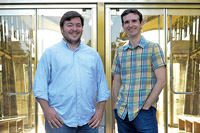The Comeback Drug
 VISITORS LOOKING FOR THE HEADQUARTERS OF IMCLONE would do well to keep the address in hand because the exterior of an aging building in lower Manhattan’s SoHo area does not reveal its corporate resident. This low profile is in sharp contrast to the screaming tabloid headlines that, for a time, dogged ImClone’s every step.
VISITORS LOOKING FOR THE HEADQUARTERS OF IMCLONE would do well to keep the address in hand because the exterior of an aging building in lower Manhattan’s SoHo area does not reveal its corporate resident. This low profile is in sharp contrast to the screaming tabloid headlines that, for a time, dogged ImClone’s every step.
In case the name has faded from memory, ImClone was made famous in 2001 by an innovative new cancer drug that lifted the company to heights of scientific and public attention and then sent hopes crashing faster than a plummeting roller coaster. An adverse letter from the Food and Drug Administration led to allegations that domestic doyenne Martha Stewart illegally dumped shares ahead of public disclosure; she went to prison for lying to investigators. The company’s founder and first chief executive officer, Samuel Waksal, is serving seven years in a federal prison for insider trading. Those events, a public relations nightmare, might have sunk any struggling start-up company.
Yet less than two years after these challenges, ImClone was thriving again. This remarkable turnaround rests on one key fact: its drug, Erbitux, works.
Confidence in Erbitux first attracted Daniel Lynch ’80 to ImClone when the company’s future seemed, if not assured, at least a good bet. The Wesleyan mathematics major had graduated from the Darden School of Business Administration at the University of Virginia and joined Bristol-Myers before it merged with Squibb. He held a number of finance-related jobs, ending up as head of finance for Bristol’s $10-billion U.S. pharmaceutical business. He grew restless mostly because he knew that he would not soon have a shot at the corporation’s top finance job, and partly because he was living in Greenwich, Conn., with his wife Elizabeth ’80, and commuting to the Princeton area.
After a two-year interlude as chief financial officer of a bicycle company headquartered in Stamford, Conn., Lynch decided to return to the pharmaceutical business.
“I had a hunch that it would be a lot more interesting to be in a small entrepreneurial setting, although that was not my principal criterion,” he says. He wanted a company with good growth prospects, and significant data had just been published confirming the potential of Erbitux. In April of 2001 he joined ImClone as chief financial officer. Soon after, he helped negotiate a deal in which Bristol-Myers Squibb agreed to pay $1 billion for a 20 percent stake in ImClone, another $1 billion over time for achieving Erbitux-related milestones and 39 percent of all future sales in exchange for North American marketing rights for Erbitux.
On December 28, the FDA dealt the company a body blow in the form of an unusually lengthy letter refusing to accept its application for approval of Erbitux. Business Week described the company’s ensuing ordeal as a mélange of “insider trading and tax scandals, ricocheting share prices, congressional hearings, management changes, and constant questions about whether the drug really works.”
The company’s relationship with Bristol-Myers chilled, but Lynch held it to the deal, agreeing only to accept slightly lower milestone payments. The stock price collapsed from a high of over $70 to about $5.
Yet the FDA had said nothing about the effectiveness of Erbitux, only that the filing did not contain sufficient information in the correct form for review. “What allowed everyone at the company, including me, to persevere in those difficult times was the understanding that nothing changed regarding the drug,” Lynch says. “It still had the same potential. That’s what allowed us to get through.”
Erbitux had its beginnings in the work of researchers at the University of California, San Diego, in the early ’80s. They were using a technique to genetically engineer antibodies that made them easier to obtain in pure form. So-called monoclonal antibodies generated considerable excitement as potential anti-cancer agents throughout the mid-’80s. The reason was simple. Attacking tumors with traditional chemotherapy is akin to carpet-bombing the body’s cells, resulting in considerable collateral damage. Antibodies, in contrast, are like laser-guided smart bombs, attacking specific molecular targets. They are much less likely to produce toxic side effects.
To investors, monoclonal antibodies sounded like the next big thing in medicine. Unfortunately, as is often the case in pharmaceutical development, the story wasn’t so simple. People treated with early monoclonal antibodies tended to react against them and become even sicker. As stocks in biotech companies plunged, skepticism about the new technology rose. According to Lynch, Bristol-Myers had acquired two companies to get in early on the action, but later abandoned the field.
Fortunately, there were scientists who remained convinced of this innovative new therapy’s potential and quietly plowed ahead with their research.
They had solid grounds for optimism, but first had to overcome a difficult problem. Our bodies make antibodies to combat foreign intruders such as flu viruses, but we don’t normally make antibodies against our own cells. For cancer, however, that’s exactly what is needed—an antibody that will attack one of the body’s own cells gone awry. Erbitux, for instance, attacks a receptor, called epidermal growth factor receptor (EGFR), that is abundant on the surface of some cancer cells and is partly responsible for rapid cell division.
Erbitux is essentially “chewing gum in a lock,” as Lynch says, that blocks the receptor from receiving “a key,” or the signal that would otherwise tell the cell to divide.
To create an antibody against this receptor that would work in humans, scientists experimented with anti-EGFR antibodies in mice. To a mouse, a human antibody would be a foreign invader and would trigger an allergic reaction.
But mouse antibodies against EGFR would cause the same reaction in people because the human immune system sees the mouse molecules as foreign and attacks them. It’s the same rejection problem that occurs in organ transplants. The solution ImClone scientists devised was to use the techniques of molecular biology to partly “humanize” the mouse molecule by combining it with human genetic components. The result is a hybrid molecule, known as a chimeric antibody, that retains the antibody activity developed in the mouse yet can slip pass human immune defenses. None of this came easily. Years of research lie behind Erbitux as well as a variety of other monoclonal antibodies that are now coming to market.
The University of California at San Diego sold the rights to Erbitux, and ImClone eventually acquired them. ImClone pays UCSD an annual licensing fee.
After the FDA issued its devastating letter, ImClone resolved to obtain the clinical data the agency sought. In the meantime, the company had to contend with the upheaval brought about by mountains of bad press, the departure of its founder, and regulatory scrutiny. Lawsuits and the threat of delisting from the NASDAQ stock exchange consumed Lynch’s time.
“We were working on a drug that, if approved, would help thousands of people,” he says. “When I got up in the morning, that got me going. Overcoming those other factors wasn’t easy, but it helped to put them in perspective.”
Asked about his life outside the office during this tumultuous period, Lynch exclaims, “What life outside the office? If you have a hearing on Monday about the potential delisting of the company, you don’t take the weekend off. We were in crisis mode and we did what we needed to do.
“Was it a burden on my personal life? Yes. Did I think twice before devoting the energy and time? No. Family and friends understood the situation.”
By April 2003, when Lynch became acting chief executive officer, ImClone had reached a critical point. Not only did the survival of the company depend upon FDA approval of Erbitux, the company also needed approval fairly quickly. It could not wait for years. Bristol-Myers was keeping the company afloat with payments that depended upon ImClone achieving certain goals within a specified time frame. Failure to gain regulatory approval would shut off the company’s only source of cash.
Fortuitously, ImClone had been working with a German pharmaceutical company to develop a regulatory filing in Europe. The 329-patient clinical trial underway for that project was developing exactly the kind of data that the FDA had requested. ImClone, Bristol-Myers, and the German company worked together to develop a new application to the FDA.
The outlook for ImClone improved dramatically on February 12, 2004, when the FDA, headed by a new commissioner who wanted to streamline the regulatory process, approved Erbitux for use with patients who have metastatic colorectal cancer. On February 24, Erbitux went on sale at a cost of $2,400 per intravenous dose. At the same time, the company named Lynch as chief executive officer.
“I think Erbitux has been well received by the worldwide medical community, though it’s still in the launch phase,” Lynch asserts. “The revenues we’ve received, which have exceeded our forecasts, confirm that.
“If you think about what’s transpired over the past year, it’s been pretty heady. Not only did we gain approval for the drug here and in the European Union, we received approval for our manufacturing facility. We plan to seek approval for the use of Erbitux with head and neck cancers. We have two other monoclonal antibodies in clinical testing. A lot of people view Erbitux as the beginning, not the end.”
Lynch views the company’s manufacturing assets, including a second manufacturing facility currently under construction, as particularly important for the company’s growth strategy. Although an extensive infrastructure exists worldwide for production of chemical pharmaceuticals, facilities for making biologic pharmaceuticals are less available. Companies that want to make monoclonal antibodies have few options for the large-scale fermentation that is required. Lynch likens the process to beer brewing on a commercial scale and notes that, as with beer, art and experience come into play. He says that ImClone will be well positioned to meet the expected rising demand for Erbitux and other antibodies it hopes to commercialize.
ImClone’s stock price has recovered, and its press coverage now tends to be positive. Lynch believes there is a moral in the company’s story.
“It’s been an incredible experience. The lessons are patience and perseverance. If you really believe in something, no matter what is said or thrown at you, just stick it out. Sometimes the current is so strong. But if you really believe, go for it.”

